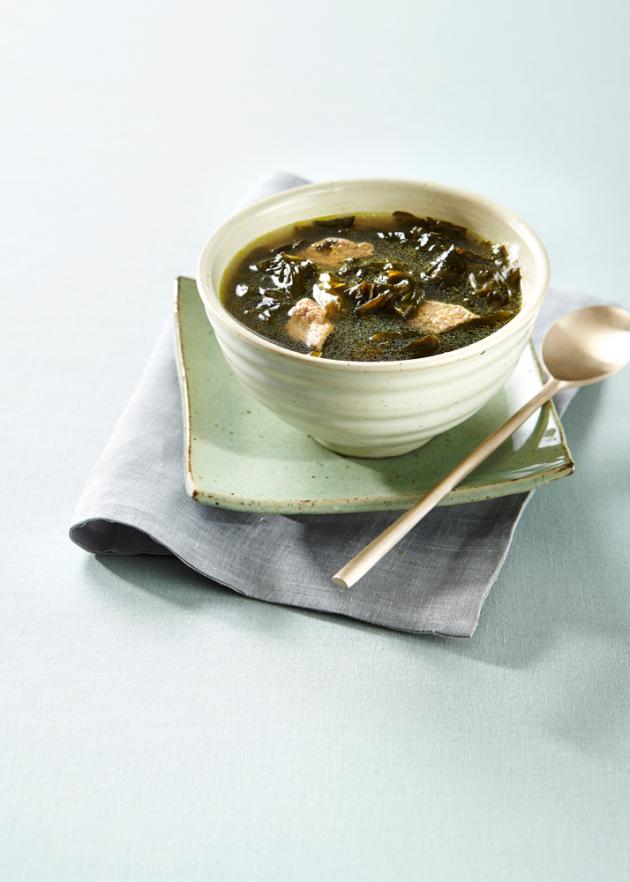Korea’s medical culture ⑧
As early as from the beginning of the Goryeo Kingdom (918-1392), Korean women have eaten seaweed soup, or miyeokguk, after childbirth.
Not much has since changed, as mothers continue to eat the soup for nearly a month after giving birth. The soup is widely known to help blood circulation and increase blood levels in the body.
“I ate miyeokguk three times a day for a month after giving birth to three of my children,” said Julie Lee, a mother in her 50s. “I love the soup, but it also helps blood flow and has a lot of health benefits. Most women around me had a similar diet.”

Many postnatal care centers that house new mothers and their babies also offer the soup at least twice a day to help mothers regain their health, with the running joke being that business takes off when their miyeokguk gains recognition.
Park Tae-hoon, a father of two, also recalls how his wife ate the soup continuously for a month after giving birth: “My wife cooked so many different types of miyeokguk -- beef, mussel, and clam – just to name a few. I was astounded she ate the same thing every day, but I understand because it is a tradition.”
Many Koreans believe the soup is essential to a woman’s diet after giving birth. In fact, sea mustard, or macroalgae, is rich with minerals concentrated in seawater such as potassium, iron, calcium, iodine, and magnesium, as well as vitamins A and C. Seaweed, also contains a molecule called fucoidans, which increases life expectancy, immunity, and cardiovascular functions. The peptides in macroalgae also help decrease heart disease and promote heart health, according to the American Journal of Agricultural and Food Chemistry.
The soup has since become symbolically linked with birth in the country. In contrast to the traditional Western birthday cake, Koreans also eat “birthday miyeokguk” which helps celebrate birthdays and show appreciation for the mother who labored to give birth.
Despite the age-long tradition of eating the soup, however, some studies have pointed toward a link between thyroid cancer and an excessive consumption of seaweed.
Recent research has found excessive amounts of the soup can affect the thyroid gland due to the high levels of iodine that is sometimes in some strands of seaweed. Although the thyroid needs iodine to produce essential hormones to regulate metabolism, excessive amounts can lead to hyperthyroidism.
In the case of cooking miyeokgook with dry seaweed, the study found 100mg of the soup contains 9000μg of iodine. The state institution advises 220μg of iodine for pregnant mothers and 270μg for breastfeeding mothers.
NSW Health issued a warning to pregnant and breastfeeding women about seaweed soup, saying that the “soup can have iodine level hundreds of times higher than the recommended daily intake” and that “high levels of iodine intake can cause hypothyroidism in newborn babies.”
South Korea has, in fact, witnessed a thyroid cancer “epidemic,” having the highest rate of thyroid cancer in the world. Thyroid cancer occurrence increased more than sevenfold from 1999 to 2009, affecting 47.5 people per 100,000, according to Medical Press. The economic burden has also increased seven times from $257 million in 2000 to $1.72 billion in 2010.
Although some doctors believe the high prevalence of thyroid cancer in Korea may be due to over-diagnosis, the numbers of doctors speculating seaweed soup to be a possible cause have grown in recent times.
“Koreans eat an excessive amount of miyeokguk due to tradition, which contains high levels of iodine. Although I am cautious to say the soup causes thyroid cancer due to the small data available, I believe there is a correlation,” said Rhee Yumie, a doctor in the Division of Endocrinology and Metabolism at Severance Hospital. “This is especially true when considering that thyroid cancer is the number one cancer to affect Korean women.”
The recent findings have become controversial, according to Rhee, who says cultural and scientific barriers make reducing consumption difficult.
In this regard, Rhee says moderation is key: Seaweed, like any other food, can become unhealthy if consumed excessively. “Currently, we can only assume that too much iodine aggravates or triggers underlying conditions of thyroid cancer. Ultimately, we need more detailed studies so we can advise the public with an official stance,” she added.
Aside from the health aspect of sea mustard soup, Koreans have also long said, “I ate miyeokguk” when they failed an exam or lost a job, just like the English expression of “I got the bag” or “I got sacked.” Eating too much miyeokguk may lead to a failure in the life’s most important test: health.

